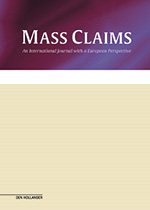Does the Aarhus Convention Require an Association Action to Protect the Environment in German Private Law?
Axel Halfmeier and Malte Schlichting1This paper examines the lack of legal standing for associations in environmental cases under German private law. Environmental claims by associations are limited to public law, while association actions in consumer law are often ineffective with regard to environmental violations. This contradicts Article 9(3) of the Aarhus Convention, which mandates public access to environmental justice. The paper advocates for legal reforms to align German law with international obligations. In this context, current developments such as the European Commission's proposal on plastic pellet loss and the European Court of Human Rights' decision in the KlimaSeniorinnen case must also be kept in mind.
1. Introduction
The United Nations Economic Commission for Europe's Convention on Access to Information, Public Participation in Decision-Making and Access to Justice in Environmental Matters (Aarhus Convention)2 was described by former United Nations Secretary-...
U heeft op dit moment geen toegang tot de volledige inhoud van dit product. U kunt alleen de inleiding en hoofdstukindeling lezen.
Wanneer u volledige toegang wenst tot alle informatie kunt u zich abonneren of inloggen als abonnee.


